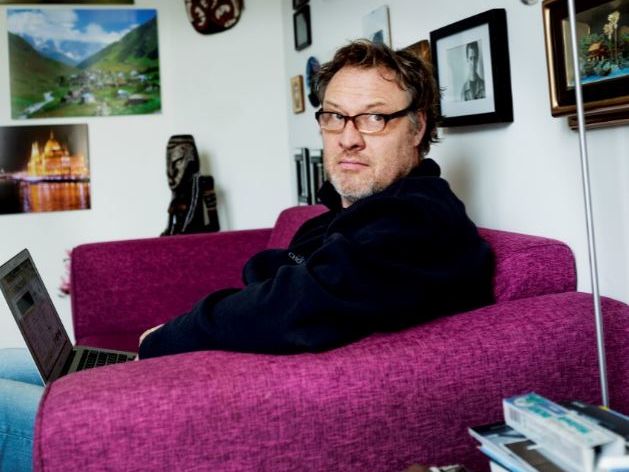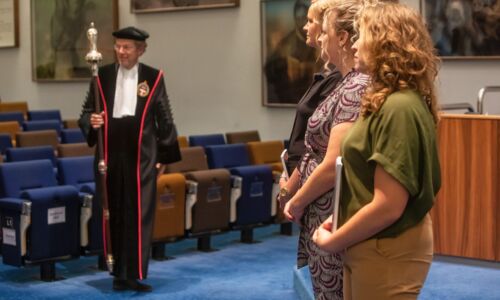‘Our obsession with rules gets in the way of happiness’
-
 Ap Dijksterhuis. Foto: Duncan de Fey
Ap Dijksterhuis. Foto: Duncan de Fey
Ap Dijksterhuis studies happiness as a scientific phenomenon. This has led him to formulating rational rules for more happiness. But also: let people decide for themselves; autonomy contributes to happiness. 'The first step is simple: get rid of unnecessary rules.'
On a dark rainy Monday Professor of Social Psychology Ap Dijksterhuis sips vending machine coffee from a mug he brought along from home. He sits down at his desk in an office on the ninth floor of the Spinoza building. The potential view is hidden by the mist.
How would you score today?
‘O, I don’t do that so often anymore. I did it for a while, give each day a score. But I’m very happy, so after a while it gets a bit boring, giving yourself a 9 every day. And rain and mist don’t really bother me.’
In his book, Op naar geluk (On To Happiness), published in 2015, Dijksterhuis offers tips for a happier life. For example: give each day a score, describe three things every day that went well, don’t let your inner muppet take over, and choose an active and serious hobby instead of aimlessly loafing around. It’s not just another self-help book, it goes a lot deeper. ‘My idea was to only write about what has been scientifically proven. And to combine Eastern and Western traditions. There are lots of Buddhism-inspired books, as well as books based on Western science, but very few books that combine the two. So that’s what I did.’
The current book Top 10 is full of books about happiness. Do you read them all?
‘Not any more. Before I wrote Op naar geluk, I read dozens of these books. Now I only read scientific articles on happiness. If I had to make two recommendations, I’d go for The Happiness Hypothesis by Jonathan Haidt and Stumbling on Happiness by Daniel Gilbert. Both were published more than ten years ago, so technically speaking they’re outdated, but still very good.’
In your book you say very little about level of education. But some statistics seem to indicate it does contribute a little to happiness.
‘These are correlations, and correlations with happiness are actually never really strong. The number of friends you have has more impact on your happiness than your education. Educational level does correlate with happiness, but so does intelligence, and these two in turn correlate with one another.’
But a one-on-one correlation, as in ‘the more intelligent, the happier’, that doesn’t apply. Is that what you’re saying?
‘Exactly. Although you can’t turn it around and say: education is not important, so let’s not bother. We have to keep educating people, and this is certainly one way we can contribute to overall happiness.’
Do you think the science of happiness should be taught as a subject in schools?
‘Yes! Scientists know what makes people happy or unhappy, or in any case they know a little bit about it. The educational system doesn’t do much with this knowledge. The topic is increasingly gaining attention, but not enough in my opinion. Why wouldn’t you tell people how to be happy? When organised education first appeared 2500 years ago in Greece, this is exactly what it was about: How to live as happy a life as possible? Now we teach people mathematics and languages, which is important too. But you could also teach them how to be happy: in secondary schools, at universities of applied sciences, at research universities, maybe even in primary schools.’
What does the science of happiness look like as a subject?
‘It’s a combination of philosophy, psychology, sociology, economics, and neuropsychology. It’s about background: what makes people happy? And about history: What did the Ancient Greeks think about it? What about the Buddha? And what happened after that? But it’s also very practical: What do you do with money you have left over? Well, that may be less relevant for students. But what do you do with your time? How can you organise it to be happier? We now teach this course to about one hundred students, but ideally it should be available to everyone.’
Is this kind of course also relevant for mathematics students?
‘Of course. It can be taught at all levels and to nearly all age groups. Why would you not be allowed to learn that experiences have more impact on your happiness than material things? In the course we also devote attention to practical aspects such as mindfulness: how do you calm your mind when you feel stressed?’
Mindfulness seems to help against stress. Do the students of today experience more stress?
‘We don’t know that. The University only recently began measuring it. What we see is that many students experience pressure and stress, that they’re less happy than we’d like them to be. But we haven’t measured happiness and stress for very long, so we don’t know yet whether things are getting worse. When I think back to my student days, I think: we weren’t so stressed. But memories from 25 years ago don’t mean very much. I do know that people feel they have much less choice than they used to; they have less autonomy. This is true not only of students, but also of staff members. You see it everywhere in organisations with more bureaucracy, such as education and healthcare.’
‘Give people space to plan their own working hours and holidays’
The question is whether you can be happy in a bureaucratic environment. Dijksterhuis is convinced that things can and should be improved. ‘Organisations in government, the healthcare sector and education have to understand that limiting people’s autonomy only increases the risk of burn-out and other problems. You also end up losing people who are a great asset. The people with the greatest need for autonomy tend also to be the most creative people. At some point you simply lose these people. They don’t want to carry on anymore. That’s a serious problem.’
Personally, Dijksterhuis works as consultant for companies and organisations in their search for more autonomy and therefore more happiness. ‘There’s a lot you can do,’ he says. ‘The first step is simply to eliminate unnecessary rules, cancel meetings, and give people space to plan their own working hours and holidays. Our obsession with rules is the biggest problem.’
Back to the students now. In your book you mention the example of study choice. That you shouldn’t be led by money considerations or what your parents want.
‘That’s right. Choose what you like. It also helps to think about what you might want to do later. Try to imagine what your day as a doctor would look like. But the most important question is: Do you enjoy this subject?’
That’s hard to know when you’re seventeen. Especially if it’s a subject you weren’t taught in secondary school, like psychology.
‘That’s true, and it’s the reason Madelijn Strick and I wrote a book on psychology for children aged 10 to 11. It’s called Tussen je oren (Between Your Ears). Psychology is now the largest academic discipline in the Netherlands, even bigger than Law, but it doesn’t get any attention in secondary schools. Kind of strange, when you think about it.’
I heard your own choice of study was not a particularly conscious process. Something about throwing a die?
‘Yes, with a friend of mine. If I had thrown a 3, I would have studied Economics. But it was a 6, so I ended up in Psychology. Luckily, very quickly I started to enjoy it. If I’d ended up with something really horrible, I would have thrown again. I think.’
[kader-xl]
In short
Ap Dijksterhuis (1968) is a Professor of Social Psychology, entrepreneur, speaker and author.
He studied Psychology in Nijmegen, where he completed his PhD in 1996. For a while, his research focused on ‘the unconscious’ and he wrote the popular scientific book Het slimme onbewuste (The Clever Subconscious) on this topic. The book sold over 100,000 copies.
For the past seven years he has focused on studying happiness, resulting in the 2015 bestseller Op naar geluk (On To Happiness). He also authored Wie (niet) reist, is gek (You’re Crazy If You Don’t Travel. And Also If You Do), Tussen je oren (Between Your Ears) (for children) and De merkwaardige psychologie van een wijndrinker (The Peculiar Psychology of a Wine Drinker).
Dijksterhuis is head of the Social Psychology Department, owner of the Karakter brewery, and founding partner of consultancy agency D&B.
[/kader-xl]
Text: Marc Janssen



